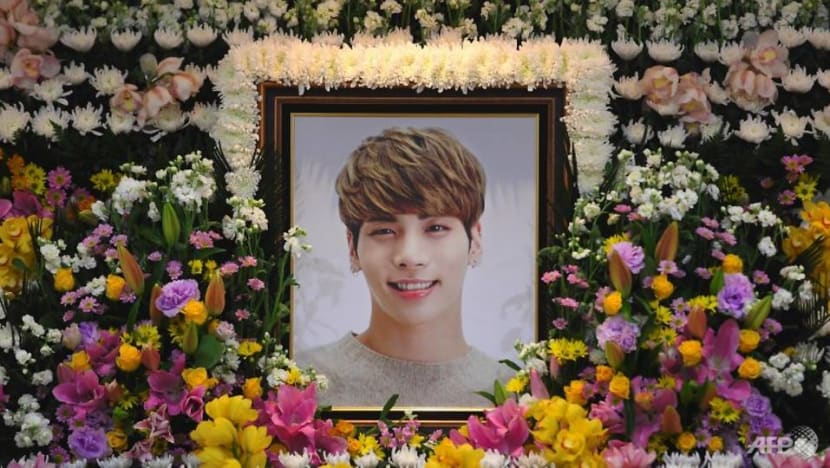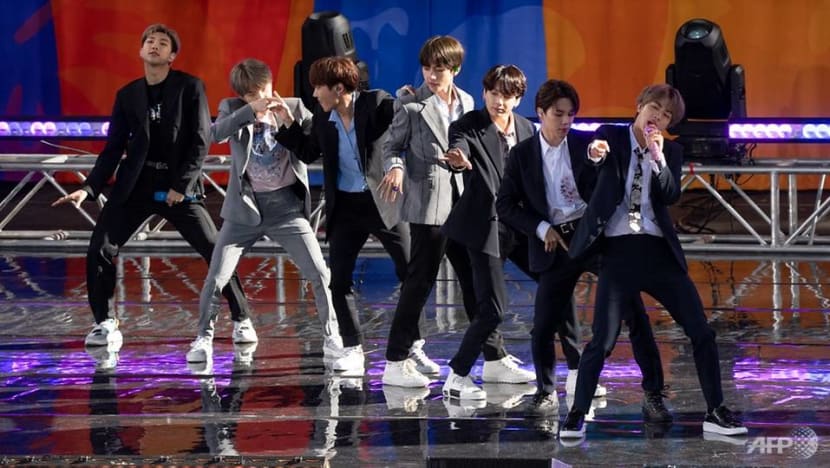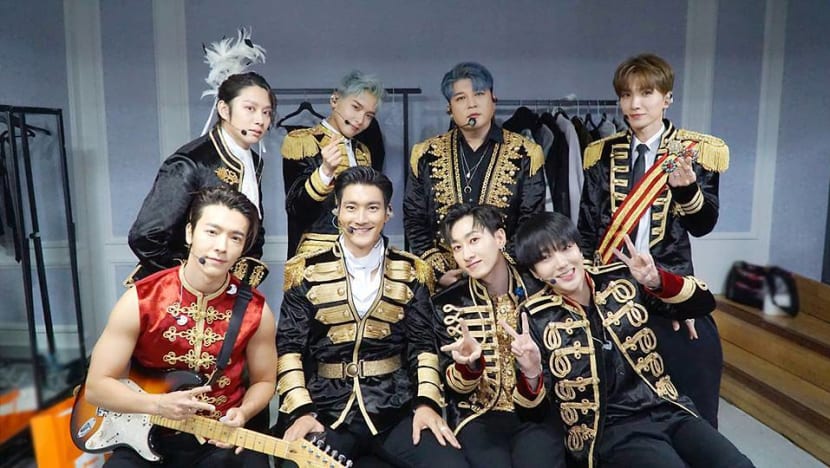commentary Commentary
Commentary: Goo Hara’s death should lead K-pop fans to do some soul-searching
Goo Hara shot to stardom when she conformed to the stereotypes of what a K-pop star involves. Now that she’s passed, perhaps it’s time K-pop fans re-examine their worship of Goo and celebrity.

Fans and celebrities have reacted to Goo Hara's death. (Photo: Instagram/koohara__)
SINGAPORE: A fresh-faced starlet in her twenties was found dead in her Seoul home.
News of her passing spread like wildfire on social media, after South Korean police indicated investigations were underway on whether suicide might have been the cause.
For weeks, she’s mourned by fans and followers on Instagram, remembered for being a sweet, sublime voice that truly represented her generation.
And for months, when her name is mentioned, people will stop and think about whether they had missed obvious signs that foretold the songstress’ untimely end.
If this had been last week, you might have thought I was referring to Sulli, former member of girl group f(x). But a similar, tragic fate befell Goo Hara on Sunday (Nov 24).

READ: Commentary: Who really killed South Korea celebrity Sulli?
THE OBSESSION WITH GOO
Fans developed an infatuation with Goo when she conformed to the stereotypes of what a K-pop star involves.
From rumours of her dating BIGBANG’s G-Dragon to her two-year, vanilla relationship with Beast's Yong Joon-hyung, they were hooked.
But when her scorned ex-boyfriend Choi Jong-bum revealed last year he had sex videos of them which he might sell, the tide turned against her very quickly.
READ: Commentary: BIGBANG’s Seungri’s sex scandal and the end of K-pop’s innocence
Though there was some sympathy for her compromised position, hardcore fans who watched her transformation from innocent 17-year-old to woman-in-a-sex-video had invested so much and felt let down.
Many poured scorn on the young woman whose biggest sin was in trusting a boyfriend who went on to betray her.
Unfortunately for Goo, female sexuality in a conservative society like South Korea’s demanded strict conformity to a long-held script. She paid the price for it. She was hastily dropped from her agency.

Her first suicide attempt in May elicited huge sympathy, but the stir it caused lost her more supporters.
Would her solo single and comeback tour in Japan held just this month rehabilitate her image and help her regain her livelihood had she lived to fight another day? We will never know.
SAD ENDS
Goo’s untimely death comes on the back of a few famed starlets who have taken their lives.
Sulli, a close friend of Goo’s, had experienced a startling amount of cyber-bullying and negative press coverage of her wild ways before meeting her unfortunate end just last month.
READ: Fans, celebrities mourn death of K-pop star Sulli, who suffered from 'severe depression'
Shinee’s Kim Jong-hyun and Jun Tae-soon made the news in the last two years when they took their lives after long, tough battles with depression.
“I was broken from the inside,” Jun’s will read.
“I had a hard time. Please let me go and say I did a good job,” read Kim’s text message to his sister just before he killed himself.

FERVENT FANDOMS
Experts have discussed how the Korean entertainment industry must do better to help young artistes cope with the shock of fame. After all, these youngsters were extracted from their adolescent lives and put through intense training and grueling schedules, only to be greeted with even greater societal pressure.
READ: Commentary: Fame and fortune doesn’t make you immune to depression
In the land of K-pop where fandoms can make or break a star with their fanaticism and financing, fans take celebrity worship to a whole new level.
Just look at the BTS Army (what the BTS fandom call themselves) who singlehandedly propelled their favourite boyband to the top of the Billboard Music Award for Top Social Artist in 2017, breaking world superstar Justin Bieber’s six-year winning streak. They chalked up huge points for their idols with their social media shares, reactions and plays.
READ: Commentary: How world sensation BTS took K-pop fandom to a whole new level
The BTS Army also dropped big bucks on concerts, digital marketing ads and huge billboards to demonstrate their love and promote their artistes – like the many they’ve taken out in New York City’s Times Square these past two years.
BTS has since gone on to smash “most-viewed”, “most followed” or “most engagement” records on TikTok, YouTube, Twitter and more.
Thanks to their fans, they’ve also achieved a level of international pop culture recognition rarely seen by K-pop stars before – performing to sold-out arena shows and popular television talkshows including Jimmy Fallon’s The Tonight Show, Jimmy Kimmel Live! and Good Morning America.

Foreign emissaries have also bought into the hype. Even the US Embassy in Seoul tweeted congratulations to the group for winning Variety’s “Group of the Year”.
THE DARK SIDE OF CELEBRITY WORSHIP
BTS might be doing fine, but their story suggests it’s no wonder K-pop celebrities feel immense pressure to meet the expectations of their most ardent fans and put on a smiling face in public. This money-spinning admiration can easily turn into an all-consuming and caustic form of celebrity idolatry.
Celebrity worship and celebrity bashing are often two sides of the same coin - with the same face. There is even a word for them – sasaeng (an obsessive fan).
READ: Commentary: K-pop fans should mourn the loss of good music not artistes
READ: Commentary: The fight for Wonho is a huge challenge to the K-pop machine
Manic fans have stalked the BTS boys, broken into their hotel rooms and given their favourite stars grief when they don’t smile or look the way they do in picture-perfect music videos and photo-shopped promotional content.
Other K-pop singers have similar bitter experiences with fame. Super Junior’s Shindong was shamed in October for putting on weight – by his own fans.

It’s not hard to see why K-pop fans put their stars on pedestals. News of which K-pop star will be going off to serve out his national service, who is going out with whom, and celebrity sightings regularly dominates South Korean headlines and feeds this compulsion.
READ: K-pop superstars BTS won't be exempted from mandatory military service
Yet it is also hard to refrain from mob judgment when social media serves up a daily dose of gossip steeped in moralism and prurience.
SOME SOUL-SEARCHNG NEEDED
While the distance separating us and celebrities has always been razor-thin, in a K-pop social-media world, where fans power star quality, brand awareness and incomes, this symbiotic relationship seems incredibly problematic.
On the one hand, fans might see themselves as selfless crusaders who go to great lengths to help advance their K-pop idol’s interests.
But surely there is little honour in the kinds of cruelty fans sometimes exercise against detractors and naysayers that border on social media lynching.
READ: K-pop singer decries cyberbullying after death of 'activist' star Sulli
Such acts are also rarely altruistic when they come dripping with obligation, even entitlement.
K-pop stars who appreciate how devoted superfans can be also understand how the cavalry can turn against them in a blink of an eye. Many a K-pop celeb have had to walk back on a comment (as Super Junior’s Choi Siwon discovered), just to keep fans happy and save themselves from a premature end to their career.

But do K-pop fanatics understand how their words and action impact the person behind the celebrity mask?
At the end of the day, do fandoms exist to police the behaviour of the starlets they pledge allegiance to? Have they become the abusive partner in the relationship with said starlet?
Although the cause of death is still under investigation, Seoul Metropolitan Police Commissioner Lee Yong-pyo has revealed Goo left behind a handwritten note expressing pessimism over her life.
READ: Bullying debate after death of K-pop star Goo Hara
It’s still early days to tell if Goo had been a victim of that kind of cyberbullying.
But perhaps it’s time K-pop fans start thinking about why so many celebrities who bring them such happiness feel such profound pessimism about their lives and whether they’ve played a role in fueling that outlook.
Lin Suling is executive editor at CNA Digital News where she oversees the Commentary section.












